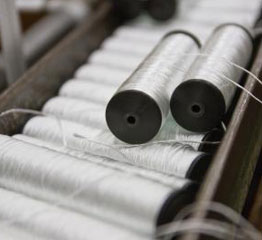Polyester fiber is lightweight, bio-compatible, quick-drying, and versatile.
 Polyester is a manufactured fiber, in which the fiber forming substance is any long-chain synthetic polymer composed of at least 85% by weight of an ester of a substituted aromatic carboxylic acid. This includes, but is not restricted to, substituted terephthalic units and parasubstituted hydroxy-benzoate units.
Polyester is a manufactured fiber, in which the fiber forming substance is any long-chain synthetic polymer composed of at least 85% by weight of an ester of a substituted aromatic carboxylic acid. This includes, but is not restricted to, substituted terephthalic units and parasubstituted hydroxy-benzoate units.
Polyester fiber properties include:
- High strength
- Dimensional stability and strength
- Lightweight
- Resistant to shrinking
- Controlled elongation
- Abrasion resistant
|
- Mildew-resistant
- Flexible
- Low moisture absorption
- Quick drying
- Chemical resistance in specific environments
- Bio-compatible
|
Technical Data
| Tenacity (g/denier) |
8.8 - 9.1 |
| Elongation at break (%) |
13.9 - 14.3 |
| Shrinkage at 177°C (%) |
7.9 |
| Melting point (°F) |
493 |
| In flame |
Burns slowly; melts and drips |
| After flame |
Self-extinguishes |
| Chemical resistance |
Good resistance to weak alkalis & weak acids. Moderate resistance to strong acids & alkali |
| Specific gravity (g/cc) |
1.38 |
| Moisture regain (%) |
0.4 |
Disclaimer: Values are only a guide. Actual values depend on manufacturer and exact type of yarn. Please contact our engineering team for specific values as they relate to your application.
 Polyester is a manufactured fiber, in which the fiber forming substance is any long-chain synthetic polymer composed of at least 85% by weight of an ester of a substituted aromatic carboxylic acid. This includes, but is not restricted to, substituted terephthalic units and parasubstituted hydroxy-benzoate units.
Polyester is a manufactured fiber, in which the fiber forming substance is any long-chain synthetic polymer composed of at least 85% by weight of an ester of a substituted aromatic carboxylic acid. This includes, but is not restricted to, substituted terephthalic units and parasubstituted hydroxy-benzoate units.





